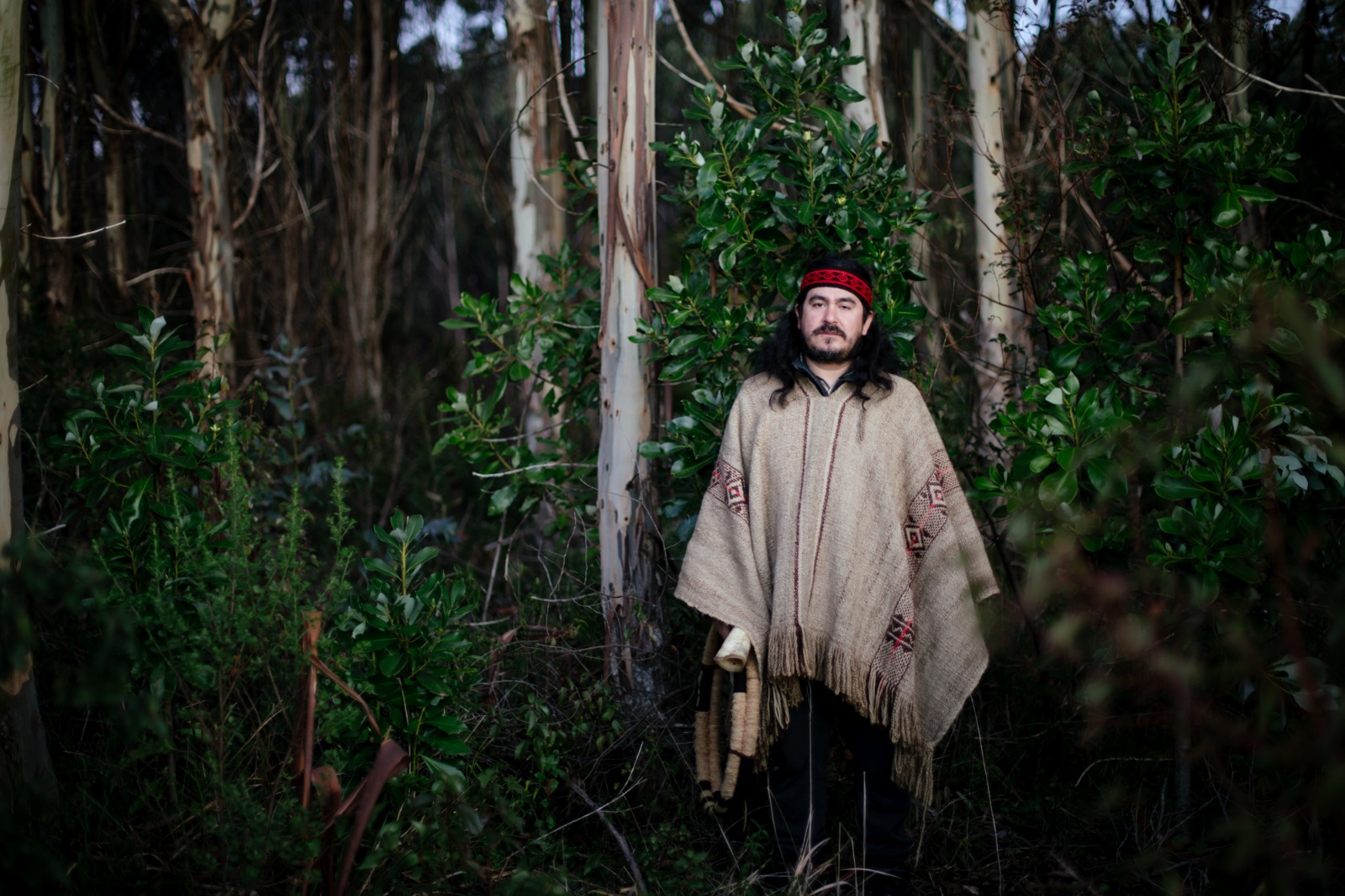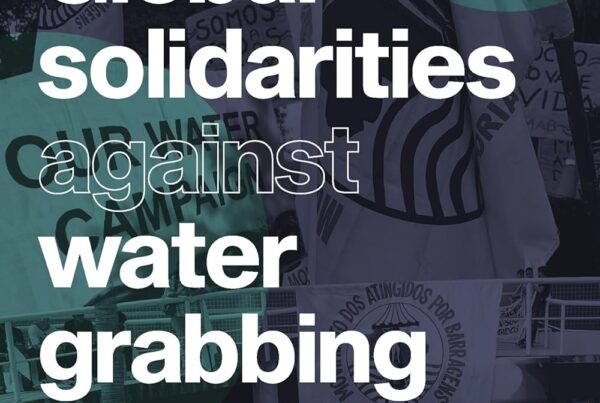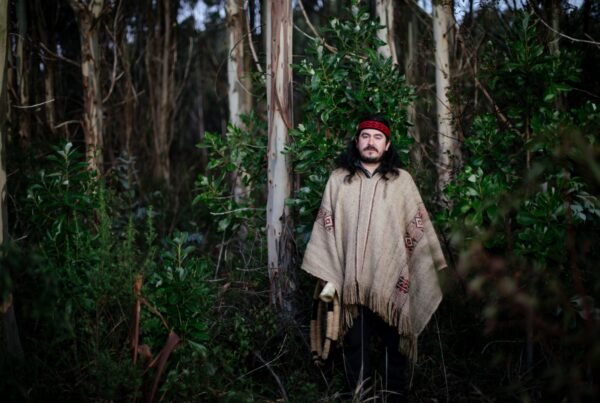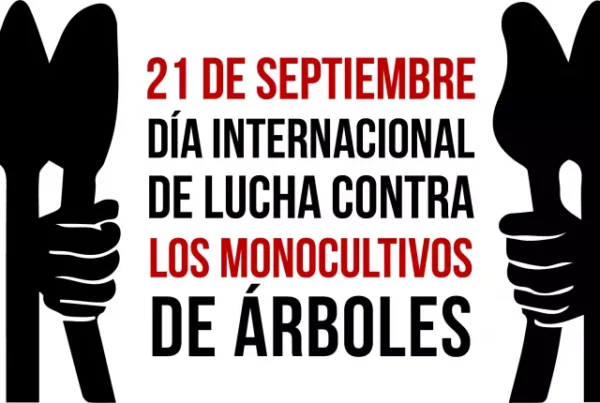We talk to Pablo Reyes Huenchumán, werkén (Mapuche spokesperson) of Lov Paillakawe, who is currently engaged in a territorial recovery in the Gulf of Arauco, Biobío Region, Chile, part of the Walmapu (Mapuche ancestral territory).
In conversation with Marien González Hidalgo.
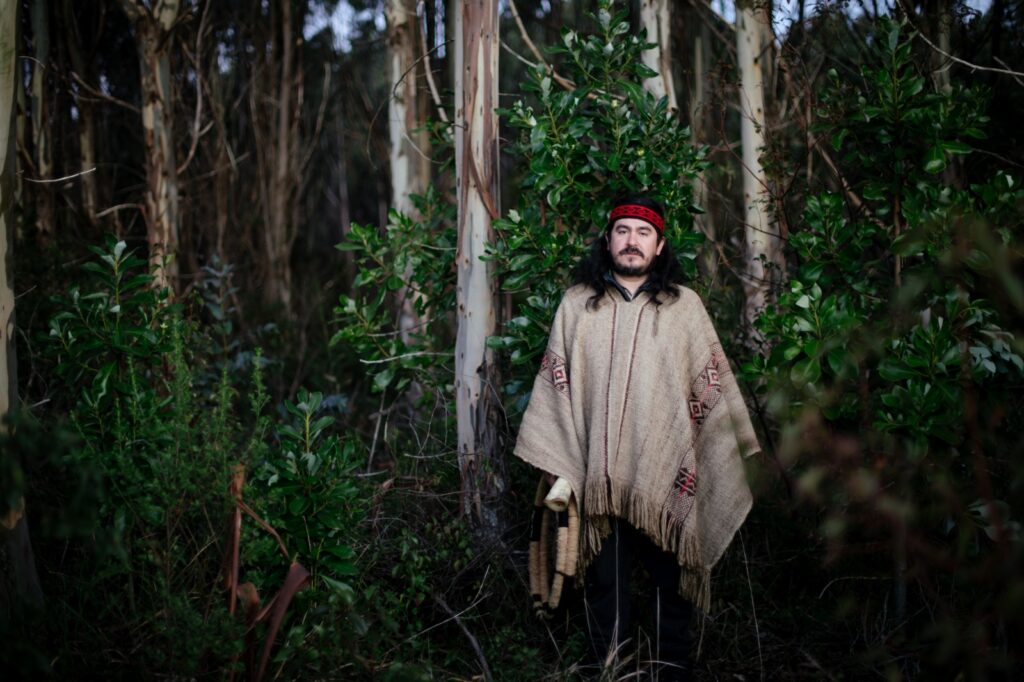
Pablo Reyes Huenchumán, at the Lov Paillakawe. Credits: Javier Tavolari
Since 2004, the “International Day of Struggle against Monoculture Tree Plantations” has been celebrated on 21 September, with the intention of denouncing, at least once a year, how large-scale industrial tree production threatens the sovereignty of communities and peoples. What would you say are the main impacts of the plantation-based forestry model on your territory?
PRH: The impacts have been going on for more than 50 years, the model was established during the Pinochet dictatorship, during which the usurpation of Mapuche territory in this area intensified. The forestry industry, specifically Arauco enterprise, owned by the Angelini group, has been acquiring huge areas of land at the expense of the people, thanks to the dictatorship, the friends and families of the dictatorship. For example, in this sector, one of the key characters was Julio Ponce, Pinochet’s son-in-law, who facilitated many plots of land being given to the National Forestry Corporation (CONAF) where he worked, and ended up selling them at a ridiculous price, ending up in the hands of the Angelini group. Currently, Arauco as a forestry enterprise owns almost 2 million hectares. For this reason, the Mapuche movement for territorial control considers that forestry companies are our contemporary, colonial enemy, because they have in their power large amounts of land which were acquired fraudulently, with the complicity of the different governments that have been involved in this process of territorial usurpation.
This is how this capitalist system is established in the sector, with peasants and Mapuche people, expropriated little by little with threats. There are stories of our family, of our lov (Mapuche family community organisation), who still remember how their houses were burnt down, and with threats from the forest guards that they had to leave because, after all, this was a forestry sector. This is understandable in the historical context, in which this area underwent a capitalist reconversion from mining and fishing production to forestry. Many agricultural lands were converted to forestry, degrading the soil. The installation of the forestry industry has had a huge impact since then, with social, environmental, political and territorial impacts.
This situation does not have a good convergence at present or in the future. Our main objective is to liberate the territorial spaces where our Kuibikecheyem (ancestors) used to live and that means exposing ourselves to confrontations with the forces of law and order: we have already suffered among the members of the community the loss of eyes, we have been victims of pellets, we have been sprayed with tear gas…
From your point of view, what factors motivate/help to maintain the plantation-based forestry model?
Forestry companies, and capital in general, are in constant reconversion, whitening their image. On the one hand, they are relying on instruments such as FSC certification (Forest Stewardship Council), which allows them to sell their product at a higher cost, saying that they work in an orderly, environmental way and without conflicts with the surrounding communities, which is a lie. There are supposed to be laws that regulate how far forestry can go in planting, for example, respecting the menoko (a wetland or lagoon with a lot of biodiversity and medicinal herbs that serve as lawen, a remedy for the community), or respecting our sacred places. But everything ends up being corrupted. For example, in the Lov Vilo community, who are in territorial recuperation near us in the Huape sector, a waterfall was intervened, and the community asked the forestry company to stop its work because a ngen (a mythological being in the Mapuche world, who is asked for permission to access a territory) lived there. The company stops the process, but inaugurates the space as a “site of cultural significance” and publishes it on social networks. The image circulates everywhere, which leads to an increase in the number of people who come to visit it, but there is no control over it. Thus, instead of being a space of care, it has been transformed into a space of rubbish, of destruction. Acts like this are committed on a daily basis through the FSC, destroying spaces as delicate as the one where the ngen lives; and if ngen are disturbed, the ones who suffer the most are us, the Mapuche.
The forestry company is now coming up with new forms of wind energy. In 2019, the Arauco forestry company, which is the company that has the most control and power in the territory, presented a project that had been planned for many years, the M.A.P.A. project, which sought to expand the pulp mill that is already located in the Gulf of Arauco. In addition, a wind farm project was planned, which was called Viento Sur. In April 2022, in the indigenous and citizen consultation process, we were invited to the consultation, and we wanted to tell them that Lov Paillakawe was within what was planned in the project. One of the towers of this wind project is planned over a Rewe (sacred Mapuche altar) that we had erected, where we currently make our prayers. Just as in the wingka (non-Mapuche) world churches, mosques…we mobilise our spirituality through the Rewe, so what this project is proposing is something very violent, for us it is inconceivable to let this happen. We would give up our lives so that it doesn’t happen, because this is the basis of our Mapuche spirituality. However, he was given all the information, but none of our questions were taken into account: we are denied the status of indigenous people, because we are not registered with the National Corporation for Indigenous Development (CONADI), because we consider ourselves Mapuche beyond a piece of paper in which the Chilean State tells us that we are Mapuche.
Furthermore, private capital takes advantage of the communities that we call yanakona (Mapuche who betray their people), which are communities that are in line with the interests of capital. Some have negotiated, for example, the extension of the M.A.P.A. project, where the companies offer economic compensation to the communities… but so far we have not seen a single community that has left poverty with the crumbs that the company gives them. But it seems to be a psychological strategy, these communities, through their leaders, are bought, ideologised through the company, for their benefit. This is how the Mapuche social fabric is unravelled. And this is not only happening in Chile, but throughout Latin America. Latin American capitalism is mediocre: it is always satisfied with the expression of raw material, and not to manage the product, but to sell the raw material as soon as possible; it does not seek to generate investment so that the people can also be owners of this resource. Thus, the state continues to be mediocre with its own people, generating development policies through these large companies as problem solvers, that it is the forestry company that solves the problem, for example, of employment. That is why they give them the space to open cultural and sports centres… in this way the state allows and facilitates the company’s involvement in the social fabric. Through propaganda and the media, they have gained all this space.
This day is not only to denounce the impacts, but also to make visible the daily resistance of the communities affected by tree plantations. How do you organise to confront the implications of this model and gain spaces of sovereignty?
We as Lov Paillakawe began this process of community formation in 2020, although we had already been working on the formation of this lov, associated with the lineage of the Huenchumán family (Kupalme Huenchuman) several years before that. It is a historical process that there is an uprising like this one in this area, which has not happened since the so-called Pacification of Araucanía. I have been given the mission of being werken and making our process visible, which has been quite hard in recent times, with processes of police and criminal prosecution, being sued by the companies, who accuse us of being usurpers, and also other judicial processes. Currently our main community processes are focused on the recovery of land, and we also carry out actions that make our process visible, such as demostrationns, street and road blockades, and legal actions.
As Mapuche people, we organise ourselves through the Trawun, which are the assemblies where communities come together to make agreements about the territory, and to share food and rituals. In the Trawun we decide what actions we are going to take, and that is how we organise ourselves and make Mapuche politics. It was in a Trawun that we agreed to carry out the process of territorial control, which consists of taking over the land, which we call recuperating, and therefore driving the forestry company away, even considering that this can imply persecution, prison and even death….. Currently, Lov Paillakawe controls about a thousand hectares, and if we also consider the territory controlled by other lov and neighbouring communities in the Gulf of Arauco, we would add up to 7000-8000 hectares. For the last three years the forestry company has not been able to enter the territories that we currently control, except for a confrontation that took place in Lov Vilo in the Huape sector, which was an action by the carabineros, the militarised police trying to enter the recovered territory with tanks.
These recoveries have been taking place for more than 20 years in other territories, further south in Arauco province, and have been proposed as processes of territorial control by the Consejo de Todas las Tierras and especially by the Coordinadora Arauco Malleco. Territorial control implies staying in the territory, making life, and exercising sovereignty in this space. And that is what we are doing: growing potatoes, peas, beans, chickens and pigs. But this has its repercussions, with the fact of entering to a plot and staying here, the forestry company has criminalised us, especially the leaders, with criminal charges of usurpation. We also suffer other forms of harassment, through drones, helicopters, chases and even shooting by forestry guards. All of us who participate in territorial recovery processes know that we are exposed to this.
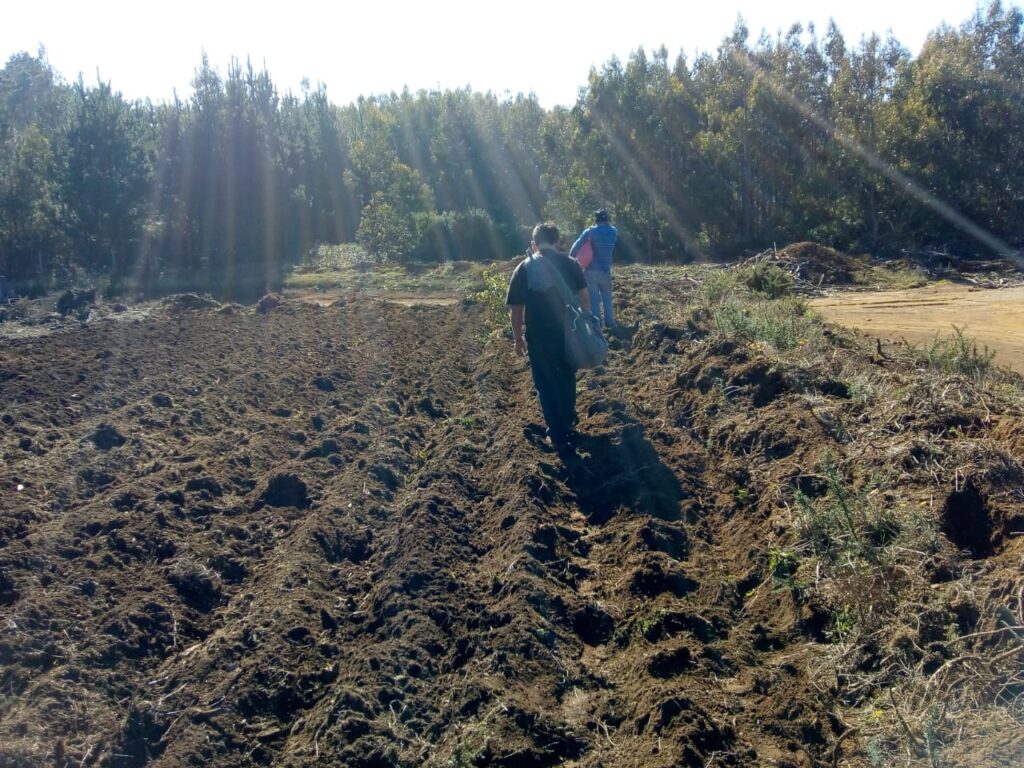
Potato field at Lov Paillakawe. Credits: Pablo Reyes Huenchumán
What are your biggest challenges in this struggle?
Militarisation is a challenge even with this government led by Boric. We fear that the Walmapu will be militarised for the next four years of government. This area of the Gulf of Arauco is not so much mentioned in the media, although when we took the streets we were called violent and all those things that it is said about the Mapuche movement says: that we are violent, terrorists, or lately that we are drug traffickers. Here, the only violence that is exercised is that of the companies and the forest guards; although these situations are denounced, they are still present.
Another challenge is dealing with company strategies. The companies generate divisions by co-opting leaders, which triggers divisions between communities and estrangement. They have sought to approach neighbouring leaders, offering to negotiate their withdrawal from the land and seek financial compensation so that they do not return. Some accept in their search of resources to feed their families… Here they have not had any results, but they have tried.
It is said that this area of Arauco is very fascist, there has been a lot of right-wing voting in recent years, and colonialism is still very present. It is difficult not to be trapped by colonialism, we try for example that our children do not participate in the patriotic events that take place especially in September in Chile, they are small actions that we carry out with our descendants. We celebrate Wetripantu (the celebration of the Mapuche solstice and new year), now all the children know that it is celebrated in June… which is good on the one hand, but also the wingka world always seems to be looking for folklorisation and one doesn’t know if sometimes it is done out of mockery or ignorance.
And what are the main motivations that help to sustain this work? What is it that helps to resist and struggle against the system that imposes and seeks to expand monoculture tree plantations in the territory?
In 2018-2020, there was a very important uprising in the Walmapu. Many many communities rose up, which also encouraged us in this sector, that the area of the Gulf of Arauco also entered into recovery processes. These recoveries have the same spirit as those of the 1960s, which took place in processes of agrarian reform with Salvador Allende, with the left-wing movements; although in a very different context, since it was during the right-wing government of Piñera. The knowledge of the processes of the previous ones and of the other currently mobilised communities of the Mapuche people encouraged us, after many years of talking about it.
As Lov Paillakawe our alliances are few, we have support from other Mapuche communities, but not with other entities. For example, through the process against the expansion of the pulp mill (M.A.P.A. project), we have been demoralised by the actions of some organisations that could be like-minded, but in which political figures enter in order to gain power and votes, and then their contribution ends up being minimal. Unfortunately, alliances with the peasant organisations are difficult, they are the ones who least want to see territorial recuperations, because it has been said that the land would be taken away from small farmers. It is a myth, like the myth of “the communists eat babies”.
What do you think are the specific institutional measures that could be taken to put people’s right to decide at the centre, beyond the interests of big capital, with respect to forestry policies?
We, Lov Paillakawe, believe that the only really effective measure that the Chilean state could take is to expropriate the land from these large forestry companies. Although there are mechanisms for returning land through CONADI, the National Corporation for Indigenous Development, they are obsolete. Recent governments have raised the quota for the purchase of land, but the reality is that less and less land is being bought, because the legal owners of these lands raise the price of the land. Thus, the land that is given back to families and communities can be up to 3 hectares. The Mapuche have always criticised this way of managing the territory, it is a mean, ridiculous way of handing the territory: the lov is a form of community life, the political and family way of developing in a territory… it is never going to be developed in 3 hectares, but in a wide territory, with physical, natural, spiritual elements, which the Mapuche need for fulfilment. So this way of returning land in recent years is not something that we as Mapuche people value. The most revolutionary thing would be therefore that the state expropriates the forest lands from large landowners for the management of the communities.
Another measure that should be taken is that the consultations related to the Indigenous and Tribal Peoples Convention 169 should be binding, not only on the Mapuche peoples but on all indigenous peoples. We are consulted, but in the end the response they get from the communities is not binding, so this is only a mere consultation. The big companies know how to handle it very well; the Chilean state has participated in the inter-American declarations of indigenous peoples with different governments, they have participated in these international laws, but they are not complied in a comprehensive manner, especially with regard to the self-determination of peoples in the economic, social, political and territorial spheres.
Unfortunately, in the new government led by Boric, the socialist party took power in the coalition. It has been seen in the decisions that have been taken from the Ministry of the Interior. This is similar to what happened in the 80s, when socialism persecuted the most radical left-wing movements, such as the MIR, the patriotic front… the socialist party played a big role in the elimination of popular movements, and the same thing is happening in this government. There are more milicos (military) on the streets, we think that this government will probably spend the next four years like this, with the Walmapu militarised. Many people are demoralised by this. In this period, some laws which continue to keep the Mapuche in poverty, have been approved, such as the one on the theft of wood. This is problematic, because in the recuperation of forested lands, the monoculture has to be eliminated, and this cannot be done overnight, and in this process resources are needed for the land to regenerate again. One of the options available to the communities in resistance is to be able to sell firewood for human consumption. But this is now punishable. Also, because of the process of the implementation of the wind farm mentioned earlier, we have no hope that this government will change things.
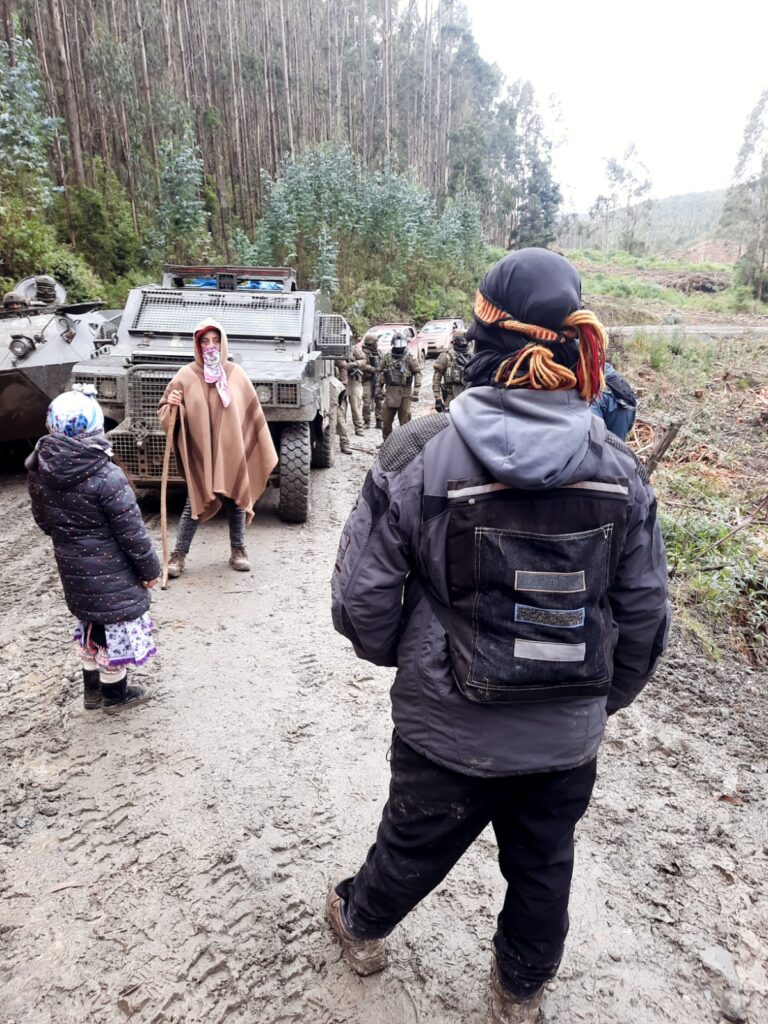
One moment of confrontation at Lov Vilo. Credits: Pablo Reyes Huenchumán
How do you imagine or dream of a future of “forest sovereignty” – i.e. where the people who live from and on the land – indigenous people, peasants, workers – have the power to decide on forest and land matters – in this territory?
Most of the territory currently controlled by the Lov Paillakawe are high hills, the coastal mountains. There are about 200 ha of native forest, rich in biodiversity, but the rest is, or was, monoculture. In spite of being a mountainous area, in certain areas it is possible to develop subsistence agriculture, family farming, lov farming, or Trafkintu (exchange) of products, as the Mapuche people did before the European invasion or even the Incas, with small-scale agricultural production, corn, different types of vegetables, beans. In this way, we dream of family and local agriculture, with products from the area and without the use of agrochemicals, which can give us stability and allow us to see our families grow, without suffering of hunger nd without being slaves of the large landowners. And also contributing to the rest of the population, so that as Mapuche people we can also contribute wheat and potatoes to the common pots. This is what we would like, to be able to return to food sovereignty for us and for the population, among the peoples.
In the areas where it is very difficult for the organic mantle to return, monoculture would be acceptable in those areas, not at the level of forestry here in the area, but on a very small scale (1-2 hectares), for the production of firewood for cooking and for the construction of minor wooden structures and improvements for the ruka (house). This would avoid the felling of native forest for these purposes. And also, leaving untouched spaces of native forest, spaces where the Ñuke Mapu (Mother Earth) has only her space, and we also have spaces for the practice of our spirituality, for the celebration of Trawun, Ngillatun (Mapuche ceremony or prayer), Palín (a game that serves to strengthen alliances between different lov) …. that is what we want to rebuild.
I want to close this interview with a greeting to all those who defend the Ñuke Mapu all over the world, and in particular to all the Mapuche political prisoners who are locked up for fighting for her, and who continue to fight until we are free from the wingka. Greetings also to who left this dimensional space and who gave their lives for the defence of our territory…as long as the koliwe continues to grow, there will be waiki (spear) so that the Mapuche struggle continues to be present!!!!
Marien González-Hidalgo is a researcher associated to the Department of Urban and Rural Development at the Swedish University of Agricultural Sciences.
This interview can be read in Spanish here.


